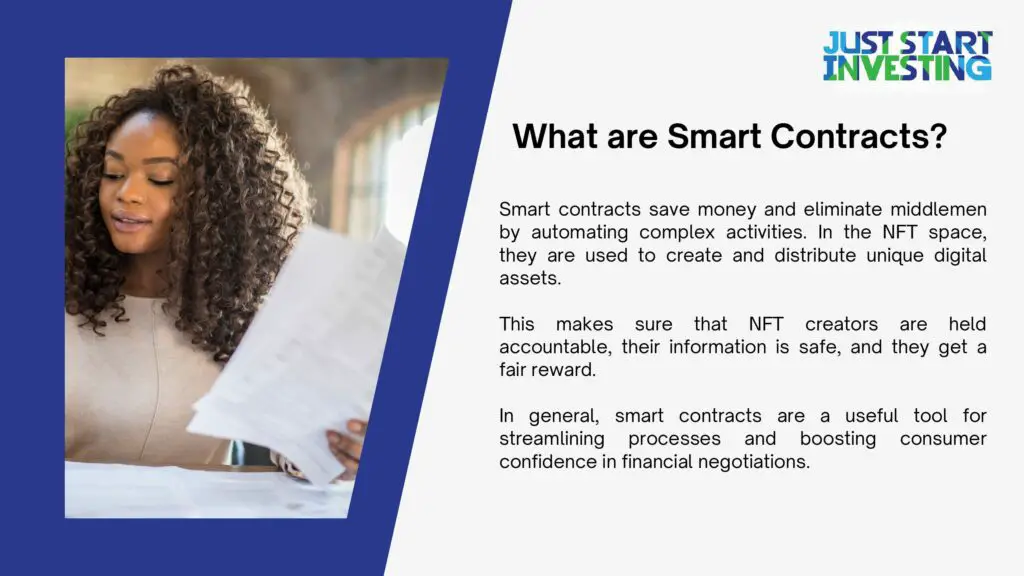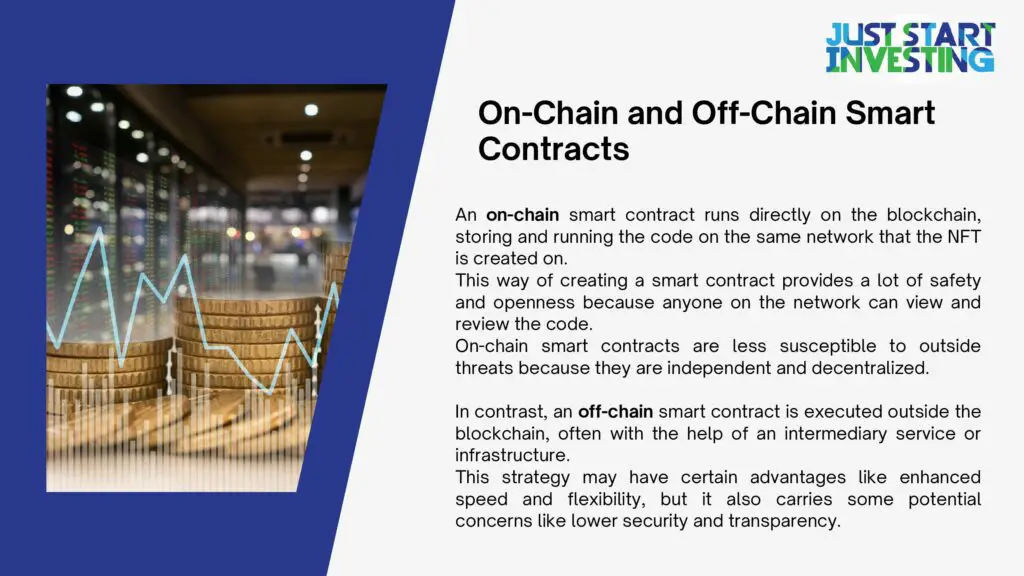NFTs, or non-fungible tokens, have become very popular in recent years, with some selling for millions of dollars. But why are NFTs so exceptional? Using smart contracts is one of the essential elements.
Smart contracts are basically contracts that run on their own, with the terms of the agreement between the buyer and seller being directly encoded into lines of code. These contracts are then saved on a blockchain, where they become secure, transparent, and unchangeable. They do away with the need for middlemen like banks or attorneys by ensuring that all participants in a transaction fulfill their responsibilities.
So how specifically does this relate to NFTs?
NFTs are produced and distributed using smart contracts, which offers a quick and safe method of creating and trading these digital assets. NFTs are distinct digital assets that are easily tracked and kept on a blockchain, making them distinctive. The creation and exchange of NFTs are made even more safe and open by the use of smart contracts.
Keep reading to find out more about the application of smart contracts in NFT minting and the prospects for this fascinating technology.
Understanding Smart Contracts

Investopedia says that “smart contracts” are programs that automatically carry out the steps in a contract or agreement. Their terms are kept in a distributed database and can’t be changed because they are executed on a blockchain.
Smart contracts save money and eliminate middlemen by automating complex activities. In the NFT space, they are used to create and distribute unique digital assets. This makes sure that NFT creators are held accountable, their information is safe, and they get a fair reward.
In general, smart contracts are a useful tool for streamlining processes and boosting consumer confidence in financial negotiations.
How Smart Contracts Work in Blockchain Technology
Smart contracts are like computer programs that work in a special way on a network of computers called nodes. This is different from regular computer programs that work on just one server. The network of computers helps make the smart contract more secure and trustworthy.
A smart contract’s rules are written in computer language, and then saved onto the blockchain. Everyone in the network can easily read and accept the rules because of this, and nobody can modify them without the network’s consent. This means that the smart contract is clear no one can change it after it has been created.
Once the contract is on the blockchain, it can automatically execute the terms of the agreement when specific circumstances are satisfied, such as a payment or a date. Using this technology means we don’t need middlemen like banks or lawyers anymore. This makes it less likely that any fraud or human error will occur because everything is done by the technology itself.
Smart contracts are utilized in the framework of NFTs to create and distribute distinctive digital assets, offering a quick and secure method for both creators and collectors. They also guarantee that ownership of an NFT is transparent and unchangeable, offering a level of security unmatched by other traditional asset classes.
Benefits of Smart Contract Use in Blockchain Transactions
The use of a smart contract provides a transparent, safe, and effective mechanism to automate and enforce agreements between parties without the need for intermediaries, lowering costs and removing the possibility of manipulation by third parties, as stated by CFI (Corporate Finance Institute).
Automation of complicated operations is one of its most important advantages. A smart contract enable process automation and the abolition of manual intervention by being programmed to carry out particular activities automatically when certain criteria are satisfied. This technology can make things faster, decrease mistakes made by people, and save both time and money.
Smart contract use is are also very secure and transparent. This is because everyone on the network can see and agree on the contract’s rules, thanks to the blockchain technology. The blockchain is also very secure because no one can change the contract’s rules without everyone else’s agreement. This means that their use is very safe and cannot be used for fraud.
The automation and transparency of this programmable contract eliminates the need for middlemen like attorneys or banks, fostering a more direct and effective interaction between the parties. This can foster trust because everyone is subject to the same rules and has access to the same information.
Current Use in Various Industries

By automating and safeguarding diverse operations, smart contracts are transforming many different businesses. Several sectors are currently using smart contracts in the following ways:
- Art & collectibles: According to LITSLINK, smart contracts are being used to uphold property rights and confirm the authenticity of works of art and collectibles. Collectors will find it simpler to assign ownership and establish authenticity as a result. For instance, the NFT marketplace Rarible employs a smart contract to confirm the legitimacy of NFTs and offer artists and collectors a transparent and secure way to purchase and sell digital art.
- Real estate: The automated purchase and sale of properties is made possible by a smart contract. They can be used to automatically transfer ownership of a property to the purchaser if certain conditions are satisfied, including the conclusion of a payment.
- Supply Chain Management: Products are tracked as they move through the supply chain using a smart contract. This offers a clear and safe approach to confirm the legitimacy of the products and the compliance of all parties with their commitments. For instance, Walmart is tracking the origin of its goods using blockchain and smart contracts to give buyers confidence in the products’ origin.
- Finance: According to IBM, the use of a smart contract eliminates the need for middlemen and, consequently, the time delays and fees they entail. Smart contracts are employed in the NFT market to make it easier for people to easily engage in buying and selling NFTs in a smooth and effective manner.
- Gaming: Decentralized gaming systems that enable users to securely and openly trade in-game assets are made using smart contracts. This makes asset trading more seamless and secure, lowering the risk of fraud and boosting confidence among gamers.
NFT Minting and Smart Contracts
Making a one-of-a-kind, non-fungible digital asset and using the blockchain to confirm its validity is known as “NFT minting.” Smart contracts are essential to this process because they offer a safe and transparent means to assign ownership and guarantee that the asset is unique.
Minting NFTs often begins with a digital asset, such as a piece of artwork or a music file, being produced by an artist or creator. They can then mint the asset as an NFT using a platform that works with NFTs, such OpenSea or Rarible.
The creator often does this by uploading the digital asset to the site and establishing a price for the NFT. A smart contract that confirms the ownership and veracity of the item as well as any other terms and conditions will then be created automatically by the platform.
The NFT can be posted for sale on the site once the smart contract has been made and verified on the blockchain. When someone buys an NFT, an NFT smart contract automatically transfers ownership to the buyer and logs the transaction on the blockchain, creating a safe and transparent record of the sale.
Moreover, NFT smart contracts can be used to create more complex virtual assets with extra features like royalty payments or unlocked content. The smart contract would be set up to automatically transmit streaming rights to the customer after the purchase has been made, for instance, if an artist created an NFT that included the ability to stream a new album.
Ensuring Transparency and Immutability in NFT Transactions
By offering a safe and visible record of ownership and transaction history on the blockchain, a smart contract enables transparency and immutability in NFT transactions. According to software marketplace G2, NFTs can create new transaction types around items that were previously impossible to sell thanks to this verifiable ownership.
It is impossible for anyone to alter or tamper with the transaction history since every transaction involving an NFT is recorded on the blockchain as a permanent, irrevocable record. Because of the high level of security and transparency provided by this, buyers and sellers can be confident in the legitimacy and ownership of the NFT.
Benefits of Using Smart Contracts in NFT Minting
Automation and security are just two advantages of using a smart contract in NFT minting. They make the NFT minting process more effective and streamlined while also lowering the possibility of errors or disputes by automating many components of it.
A smart contract also gives a high level of security by ensuring that the NFT is unique, authentic, and controlled by the proper owner.
Smart contracts allow NFT creators and artists to establish and enforce specific terms and conditions for the sale of their NFTs in addition to automating and securing the transaction. This might involve things like royalties, unlocking material, or restrictions on distribution or resale.
Technical Details in NFT Minting
The rules and logic regulating the creation and ownership of digital assets are included in an NFT smart contract, which is a piece of code that is deployed on the blockchain in the NFT minting process.
Programming languages like Solidity or Vyper, which are created expressly for developing apps on the Ethereum blockchain, are frequently used to create smart contracts. These programming languages resemble Python or JavaScript but also include certain extra capabilities designed specifically for blockchain development.
Once produced, the smart contract is converted into bytecode, a form of machine-readable code. The network of computers running the blockchain software then deploys this bytecode to the blockchain for execution. The blockchain is used to execute the NFT smart contract code each time it is used, and the results are then kept there permanently and cannot be altered.
Smart contracts operate in a safe and decentralized environment, which means that a network of computers running the blockchain software controls them rather than a single central authority.
This way of working provides a lot of security and dependability. It also makes sure that the NFT smart contract is carried out in a way that can’t be changed, which increases transparency.
Differences Between On-Chain and Off-Chain Smart Contracts

Smart contracts can be on-chain or off-chain.
An on-chain smart contract runs directly on the blockchain, storing and running the code on the same network that the NFT is created on. This way of creating a smart contract provides a lot of safety and openness because anyone on the network can view and review the code. On-chain smart contracts are less susceptible to outside threats because they are independent and decentralized.
In contrast, an off-chain smart contract is executed outside the blockchain, often with the help of an intermediary service or infrastructure. This strategy may have certain advantages like enhanced speed and flexibility, but it also carries some potential concerns like lower security and transparency.
The degree of confidence required in the third-party service or infrastructure is one of the primary distinctions between on-chain and off-chain NFT smart contracts. Off-chain smart contracts frequently rely on dependable middlemen to carry out the contract, which can result in some centralization and potential security flaws.
Potential Security Risks and Best Practices
The possibility of bugs or security flaws in the code is one of the main dangers connected with using a smart contract to mint NFTs. This might make it possible for an attacker to take advantage of the contract and get unapproved access to NFTs or money. It is essential to thoroughly test the NFT smart contract code and conduct routine audits by security professionals in order to reduce this danger.
The potential for a denial-of-service (DoS) attack is another risk. This occurs when a smart contract stops functioning properly due to someone sending it too many requests. It is advised to limit the amount of input data and provide means for controlling the frequency of transactions in order to prevent this.
Furthermore, because of their reliance on outside services and data sources, smart contracts are open to assaults. Any external services that the smart contract utilizes must be trustworthy and safe.
Using credible and well-established smart contract development frameworks and libraries is crucial in terms of best practices. In order to lower the danger of assaults, developers should also be aware of gas fees and make sure that the smart contract is efficient.
Also, it is advised to use a safe wallet to store the private key needed to sign transactions as well as multi-signature authentication to gain access to smart contract features. This will guarantee that the smart contract can only be accessed by those who are authorized.
The Future of NFTs and Smart Contracts
The way we generate, exchange, and value digital assets has already undergone a transformation thanks to the application of smart contracts in the NFT space. We can anticipate seeing even more cutting-edge smart contract use cases as blockchain technology continues to improve.
The fusion of smart contracts with other innovative technologies, including artificial intelligence and machine learning, represents one area of potential growth.
As new applications and use cases emerge in industries like gaming, virtual reality, and social media, we can also anticipate continuous development in the NFT sector overall. The usage of smart contracts will be increasingly more essential as NFTs gain in popularity for preserving the security and integrity of these digital assets.
Conclusion
The use of smart contracts in the creation of NFTs has changed the way that the world of digital content is viewed. Smart contracts make transactions trustworthy and have several benefits by utilizing the power of blockchains, such as automation, transparency, and security.
We may anticipate seeing even more advanced use cases and breakthroughs in the realm of smart contracts as the NFT market continues to develop and grow. They may pose security issues, but best practices and careful due diligence can help reduce these risks and guarantee the security and integrity of virtual assets.
Overall, the way we generate, exchange, and value digital products is changing as a result of the usage of smart contracts to mint NFTs. In the next few years, we are curious to see how this technology will keep impacting the NFT market and the wider blockchain community.

Just Start Investing is a personal finance website that makes investing easy. Learn the simple strategies to start investing today, as well as ways to optimize your credit cards, banking, and budget. Just Start Investing has been featured on Business Insider, Forbes, and US News & World Report, among other major publications for its easy-to-follow writing.
